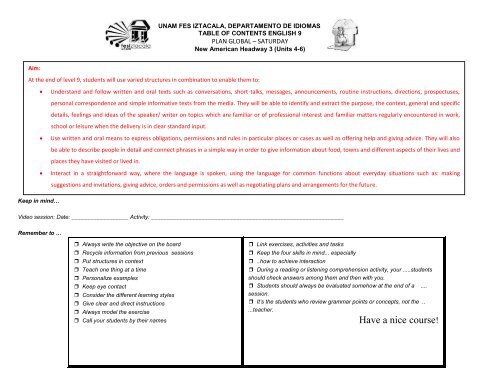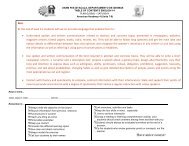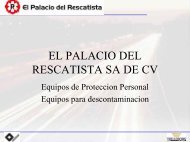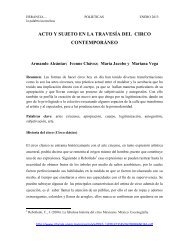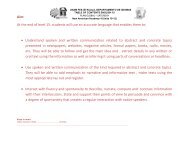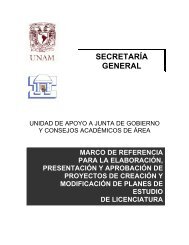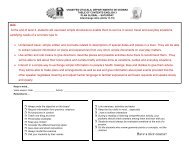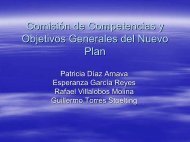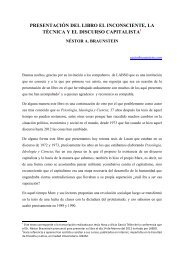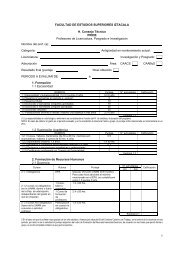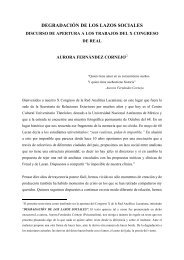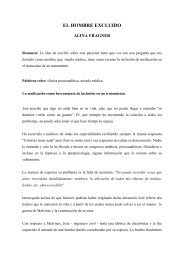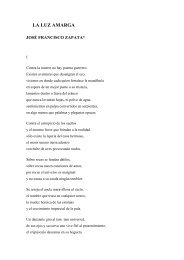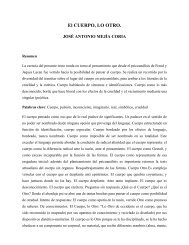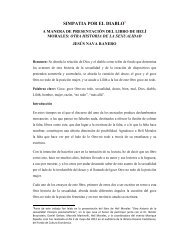Have a nice course! - UNAM
Have a nice course! - UNAM
Have a nice course! - UNAM
Create successful ePaper yourself
Turn your PDF publications into a flip-book with our unique Google optimized e-Paper software.
<strong>UNAM</strong> FES IZTACALA, DEPARTAMENTO DE IDIOMAS<br />
TABLE OF CONTENTS ENGLISH 9<br />
PLAN GLOBAL – SATURDAY<br />
New American Headway 3 (Units 4-6)<br />
Aim:<br />
At the end of level 9, students will use varied structures in combination to enable them to:<br />
<br />
Understand and follow written and oral texts such as conversations, short talks, messages, announcements, routine instructions, directions, prospectuses,<br />
personal correspondence and simple informative texts from the media. They will be able to identify and extract the purpose, the context, general and specific<br />
details, feelings and ideas of the speaker/ writer on topics which are familiar or of professional interest and familiar matters regularly encountered in work,<br />
school or leisure when the delivery is in clear standard input.<br />
<br />
Use written and oral means to express obligations, permissions and rules in particular places or cases as well as offering help and giving advice. They will also<br />
be able to describe people in detail and connect phrases in a simple way in order to give information about food, towns and different aspects of their lives and<br />
places they have visited or lived in.<br />
<br />
Interact in a straightforward way, where the language is spoken, using the language for common functions about everyday situations such as: making<br />
suggestions and invitations, giving advice, orders and permissions as well as negotiating plans and arrangements for the future.<br />
Keep in mind…<br />
Video session: Date: __________________ Activity: _____________________________________________________________<br />
Remember to …<br />
❒ Always write the objective on the board<br />
❒ Recycle information from previous sessions<br />
❒ Put structures in context<br />
❒ Teach one thing at a time<br />
❒ Personalize examples<br />
❒ Keep eye contact<br />
❒ Consider the different learning styles<br />
❒ Give clear and direct instructions<br />
❒ Always model the exercise<br />
❒ Call your students by their names<br />
❒ Link exercises, activities and tasks<br />
❒ Keep the four skills in mind... especially<br />
❒ ..how to achieve interaction<br />
❒ During a reading or listening comprehension activity, your .....students<br />
should check answers among them and then with you.<br />
❒ Students should always be evaluated somehow at the end of a ....<br />
session.<br />
❒ It’s the students who review grammar points or concepts, not the ..<br />
...teacher.<br />
<strong>Have</strong> a <strong>nice</strong> <strong>course</strong>!
SESSION<br />
Rules for life<br />
<strong>UNAM</strong> FES IZTACALA, DEPARTAMENTO DE IDIOMAS<br />
TABLE OF CONTENTS ENGLISH 9<br />
PLAN GLOBAL – SATURDAY<br />
New American Headway 3 (Units 4-6)<br />
VOCABULARY NOTIONS FUNCTIONS USE OF ENGLISH EXAMPLE PHONETICS SUGGESTED TASKS<br />
Orient students in the <strong>course</strong> in general: projects, evaluation, methodology, etc. Carry out a DIAGNOSTIC TEST<br />
Objective: Students will be able to talk about obligations and rules in particular places or cases as well as expressing requests.<br />
1<br />
Stages of human<br />
development.<br />
SB 29-31 wb 27<br />
Rights and<br />
obligations at<br />
home, school<br />
and jobs. SB 24<br />
Rights and<br />
obligations<br />
Testing: Asking and<br />
giving permission to<br />
someone Sb.p. 27, 28<br />
Teaching: Talking about<br />
the things you can do or<br />
not Sb. p. 27,28<br />
Testing: Talking about<br />
rules and obligations at<br />
different levels. Wb. p.<br />
24, 25. 28<br />
Testing: Expressing lack<br />
of obligation Wb. p.24, 25<br />
Can:<br />
Affirmative, negative<br />
and question<br />
statements.<br />
Be allowed to:<br />
Affirmative, negative<br />
and question<br />
statements.<br />
Should<br />
Must<br />
<strong>Have</strong> to<br />
Not have to<br />
Can I stay at my friend’s<br />
house?<br />
You can’t go if you don’t<br />
help your mom.<br />
What time are you<br />
allowed to get home?<br />
I’m not allowed to arrive<br />
after 12.<br />
You should participate in<br />
the elections if you are<br />
asked to.<br />
You have to follow the<br />
rules into a museum<br />
You must throw the<br />
garbage in the baskets.<br />
You don’t have to wear a<br />
uniform in the university.<br />
Can/can’t<br />
Allowed<br />
<strong>Have</strong> to<br />
TASK 1 Oral (pairs):<br />
T should provide with role cards and situations.<br />
Role card Ask for permission to…<br />
SA: Teacher Hand in the homework<br />
SB: student later.<br />
SA: Parent Spend the weekend at a<br />
SB: child friend’s house.<br />
SA: Employer <strong>Have</strong> a day off<br />
SB: employee<br />
Student A: Your partner will ask for your<br />
permission to do an activity. Give the permission<br />
but make him know he needs to follow certain<br />
rules.<br />
E.g. You can go but you must finish your<br />
homework.<br />
Student B: Ask for permission. Convince your<br />
partner. Let him know that you are very<br />
responsible – because you know what your<br />
responsibilities are.<br />
E.g. SB: I know I have to clean y room and I’ll do<br />
it.<br />
Useful<br />
vocabulary at a<br />
restaurant,<br />
clothing store Sb<br />
33<br />
Request and<br />
offers<br />
Teaching: Requesting<br />
and giving help Sb. p. 33<br />
Can<br />
Could<br />
Would<br />
Could you make a copy<br />
for me?<br />
Yeah, I can give you<br />
mine I won’t use it<br />
anymore.<br />
Would you like a cup of<br />
coffee?<br />
Yeah, I can prepare it if<br />
that’s ok to you.<br />
Could /<br />
would<br />
‘d<br />
Must<br />
should<br />
TASK 2 Oral (pairs):<br />
Use the prompts in Sb. 33 Role play
SESSION<br />
Pieces of advice<br />
<strong>UNAM</strong> FES IZTACALA, DEPARTAMENTO DE IDIOMAS<br />
TABLE OF CONTENTS ENGLISH 9<br />
PLAN GLOBAL – SATURDAY<br />
New American Headway 3 (Units 4-6)<br />
VOCABUL<br />
ARY<br />
NOTIONS FUNCTIONS USE OF ENGLISH EXAMPLE PHONETICS SUGGESTED TASKS<br />
Objective: Students will be able to convey specific functions such as advice, permission and obligation to give tips and suggestions.<br />
Tips for<br />
traveling.<br />
Good<br />
manners<br />
WB 23,26<br />
Phrasal<br />
verbs Wb p.<br />
28 Sb. 32<br />
Testing: Making<br />
suggestions at different<br />
levels.<br />
Should<br />
Must<br />
<strong>Have</strong> to<br />
If you’re coming to Mexico you have to<br />
be careful with your belongings, you<br />
shouldn’t take a lot of money with you<br />
and you must be careful with strange<br />
people.<br />
should<br />
TASK 3 written (individual):<br />
You want to host people from other countries to<br />
practice your English.<br />
Create your profile in:<br />
Describe the place you offer to stay in, give<br />
some specifications and rules to be your guest<br />
and include a guide to good manners in Mexico.<br />
2<br />
Pieces of advice<br />
Modern<br />
dilemmas<br />
Sb p. 26,<br />
145<br />
Testing: degrees when<br />
making suggestions…<br />
Modal verbs:<br />
Can<br />
Be allowed<br />
Should<br />
Must<br />
<strong>Have</strong> to<br />
You have to act witrh self-control.<br />
It’s not only wrong you’re not allowed<br />
to do this.<br />
Could / would<br />
‘d<br />
Must<br />
Should<br />
Allowed<br />
Can/can’t<br />
TASK 4 written (groups)<br />
Pre-task SB. 145<br />
You’ve got a dilemma. Publish it in ‘Yahoo<br />
answers’ to get the best advice.<br />
Read the dilemmas published and participate<br />
giving advice. If your answer is selected as the<br />
best, you can get 10 points to improve your<br />
reputation in the Yahoo community.
SESSION<br />
Our changing world<br />
<strong>UNAM</strong> FES IZTACALA, DEPARTAMENTO DE IDIOMAS<br />
TABLE OF CONTENTS ENGLISH 9<br />
PLAN GLOBAL – SATURDAY<br />
New American Headway 3 (Units 4-6)<br />
NOTIONS VOCABULARY FUNCTIONS USE OF ENGLISH EXAMPLE PHONETICS SUGGESTED TASKS<br />
Objective: Ss will be able to ask and give information about their future, varying their expressions depending on WHEN the decision was made and HOW the speaker sees the future event.<br />
3<br />
Predictions<br />
Intentions<br />
Opinions<br />
vs.<br />
evidence<br />
Weather<br />
Future plans<br />
for education,<br />
job, love,<br />
health.<br />
Expressions for<br />
opinions: I<br />
think... I’m<br />
sure…SBp33<br />
Testing: Predicting and<br />
foreseen possible situations. SB<br />
35<br />
Testing: Planning, asking and<br />
giving information about future<br />
intentions.<br />
Teaching: Predictions based on<br />
an opinion vs. prediction based<br />
on present facts (evidence)<br />
Future: will<br />
(Affirmative & negative<br />
statements, Yes/No and<br />
Wh- questions)<br />
Future: be going to<br />
(affirmative & negative<br />
statements, Yes/No and<br />
Wh- questions)<br />
Will vs be going to (2)<br />
(affirmative & negative<br />
statements, Yes/No and<br />
Wh- questions)<br />
Tomorrow the weather<br />
will be cloudy and windy.<br />
He’s going to study his<br />
major abroad.<br />
I think I’ll have two kids<br />
vs.<br />
She’s going to have<br />
twins.(she’s pregnant)<br />
Contraction:<br />
‘ll won’t<br />
Contraction:<br />
‘s /’re / isn’t/<br />
aren’t<br />
going to<br />
question<br />
intonation<br />
contractions<br />
/ө/ think<br />
TASK 5. Written and oral (groups) 1<br />
a) Fortune cookies are finished in the restaurant<br />
and your boss asks you to write some. Work in<br />
groups to make them up (love, weather, job,<br />
family, health, entertainment).<br />
b) Exchange fortune cookies with another group.<br />
Each person in your groups will take one and<br />
disagree with the prediction. After disagreeing tell<br />
the group your plans for that situation.<br />
TASK 6. Written (pairs)<br />
Pre-task SBp37<br />
Write a short essay about how traveling will be<br />
different in the future.<br />
Differentiate between the info based on evidence<br />
and your opinion.<br />
TASK 7. Oral (small groups)<br />
Pre-task SB 38-39<br />
Imagine life in 50 years, decide which ideas are<br />
likely to happen (SBp38 es 5) and which ones not.<br />
1 We recommend to start with this activity as it can be useful as a warm-up and a test for will and going to. Later, you can check the exercises provided by the book.
SESSION<br />
Arrangements<br />
<strong>UNAM</strong> FES IZTACALA, DEPARTAMENTO DE IDIOMAS<br />
TABLE OF CONTENTS ENGLISH 9<br />
PLAN GLOBAL – SATURDAY<br />
New American Headway 3 (Units 4-6)<br />
NOTIONS<br />
VOCABULAR<br />
Y<br />
FUNCTIONS USE OF ENGLISH EXAMPLE PHONETICS SUGGESTED TASKS<br />
Review last session, check homework<br />
Objective: Ss will be able to talk about their plans emphasizing the certainty. As well as describe people, food and places.<br />
Arrangements<br />
Teaching: Asking and<br />
giving information about<br />
future arrangements Wb. p.<br />
33, Sb. p. 41<br />
Future: Present<br />
continuous<br />
(affirmative & negative<br />
statements, Yes/No<br />
and Wh- questions)<br />
I’m meeting Peter tonight at 7.<br />
- ing endings<br />
TASK 8. Written and oral (groups of<br />
3) Sb. p. 41 ex. 3<br />
Pre- task: Listening write a planner<br />
for the next week.<br />
Your teacher left a project to be done<br />
in teams. All of you have a busy<br />
schedule; get into an agreement to<br />
meet up.<br />
4<br />
Plans:<br />
intentions<br />
vs.<br />
arrangements<br />
Days of the<br />
week<br />
The time<br />
Activities and<br />
plans<br />
Teaching: Asking and<br />
giving information about<br />
plans as intentions vs. fixed<br />
plans WB 32<br />
Future: be going to vs<br />
present continuous<br />
(affirmative & negative<br />
statements, Yes/No<br />
and Wh- questions)<br />
I have a terrible toothache I’m going to<br />
see the dentist. (I have the intention to go)<br />
vs<br />
I have a terrible toothache I’m seeing the<br />
dentist at 4pm this afternoon. (I already<br />
have the appointment)<br />
Contractions:<br />
I’m, ‘s ‘re<br />
TASK 9. Written (pairs)<br />
You and your brother were in charge<br />
of planning a family trip.<br />
9a. Discuss with your brother: what<br />
your favorite destinations are like?<br />
(Places, food and people). Choose<br />
the best option to go on a trip.<br />
9b. Tell your cousins about the<br />
decision you made about the trip.<br />
Write them an e-mail to inform them<br />
a) that you have already booked the<br />
hotel, the days you‘re staying there,<br />
the transportation; b) activities that<br />
are your intention to do and places<br />
you want to see; c) your opinion<br />
about how things will be.
SESSION<br />
What matters to me<br />
<strong>UNAM</strong> FES IZTACALA, DEPARTAMENTO DE IDIOMAS<br />
TABLE OF CONTENTS ENGLISH 9<br />
PLAN GLOBAL – SATURDAY<br />
New American Headway 3 (Units 4-6)<br />
NOTIONS VOCABULARY FUNCTIONS USE OF ENGLISH EXAMPLE PHONETICS SUGGESTED TASKS<br />
Review last session, check homework<br />
Objective: Ss will be able to ask and give information about people’s personality, appearance and likes/dislikes.<br />
People’s<br />
appearance<br />
People’s<br />
personality<br />
Likes and<br />
dislikes<br />
Adjectives to describe<br />
people’s personality<br />
and appearance<br />
Compound adjectives<br />
SB 44<br />
Antonyms WB. 40 ex<br />
9<br />
Teaching: Asking for<br />
physical appearance 2<br />
Teaching: Asking for<br />
personality traits<br />
Teaching: Asking for<br />
leisure activities<br />
What/ who+ do/ does<br />
+☺ + look like?<br />
What + is + ☺ + like?<br />
Do/ does+☺+ like+<br />
verb (-ing)?<br />
Mark? Maybe… I met him…What<br />
does he look like?<br />
Who do you look like in your family?<br />
What is your best friend like<br />
Do you like running in the morning?<br />
who<br />
- ing endings<br />
in gerunds<br />
TASK 10. oral (groups of 3)<br />
A student visitor is in your friend’s<br />
class and you’re interested in him/her.<br />
Ask your friend about his/her physical<br />
appearance, personality and interests.<br />
5<br />
General<br />
description<br />
Adjectives to describe<br />
food, town, people.<br />
-ed vs. -ing adjectives<br />
SB 44 WB 40<br />
Testing: Asking for a<br />
general description or<br />
impression of the things<br />
and people 3<br />
What + be +☺ + like?<br />
What are Mexican people like?<br />
They are friendly, generous and<br />
sometimes lazy.<br />
delicious<br />
busy<br />
-ed/ -ing<br />
endings in<br />
adjectives<br />
TASK 11WRITTEN<br />
Pre task SB P.44<br />
A) you have spent a long time without<br />
any love relationship and decided to<br />
post a newspaper notice to find a<br />
mate. Write your description and the<br />
one of the man/woman you’d like to<br />
find. SBp44<br />
Current<br />
state of<br />
people and<br />
things<br />
Leisure activities<br />
Teaching: Asking for<br />
people’s health, feelings<br />
and the present<br />
condition of<br />
something.SB48 WB 37<br />
How+ be+☺?<br />
How is your father?<br />
He’s fine. Healthy and strong as an<br />
ox!<br />
How<br />
TASK 12. Oral (groups of 3)<br />
Your friend looks different today. Ask<br />
how he feels and suggest some<br />
activities to change his mood.<br />
Note for the teacher: Encourage Ss to<br />
use “questions WOULD” as<br />
suggestions and iclude activities with<br />
MAKE/DO.<br />
2 Ss might think that as these topics are tested there is nothing new to learn. However, this class should be more focused on upgrading and widening the vocabulary (adjectives and adverbs+<br />
adjectives).<br />
3 Ss might think that as this topic is tested there is nothing new to learn. However, this class should be more focused on upgrading and widening the vocabulary (adjectives and adverbs+ adjectives).
SESSION<br />
Important Places<br />
<strong>UNAM</strong> FES IZTACALA, DEPARTAMENTO DE IDIOMAS<br />
TABLE OF CONTENTS ENGLISH 9<br />
PLAN GLOBAL – SATURDAY<br />
New American Headway 3 (Units 4-6)<br />
NOTIONS VOCABULARY FUNCTIONS USE OF ENGLISH EXAMPLE PHONETICS SUGGESTED TASKS<br />
Review last session, check homework<br />
Objective: Ss will be able to ask and give information about a place that’s important for them and explain why<br />
6<br />
Why is a<br />
place<br />
important<br />
Phrasal verbs<br />
related to these<br />
topics:<br />
Trips<br />
Relationships<br />
Hurry up!<br />
Moving<br />
WB. 42<br />
Testing: asking and giving<br />
information about a place<br />
SB. 46-47<br />
What,,,like?<br />
How?<br />
Like/as<br />
What was your new house<br />
like?<br />
We moved on to a<br />
wonderful but very tiny<br />
detached in the suburbs.<br />
How was the hotel in<br />
Rome?<br />
It was horrible when we<br />
found out nobody was<br />
picking us up at the airport<br />
and we ended up in one of<br />
the dirtiest places I’ve ever<br />
seen in my life.<br />
How was he?<br />
I can clearly remember<br />
how his face looks the day<br />
they split up, he was so<br />
unhappy and sad but<br />
relieved as the nightmare<br />
was over.<br />
-ed<br />
as<br />
linking 2 words:<br />
split up<br />
find out<br />
held on<br />
etc.<br />
TASK 13: Written<br />
A TV program will take you to your<br />
most remarkable place in your life.<br />
The only thing you should say is why<br />
this place is important to you,<br />
describe it and say what you would<br />
do once you are there.
<strong>UNAM</strong> FES IZTACALA, DEPARTAMENTO DE IDIOMAS<br />
TABLE OF CONTENTS ENGLISH 9<br />
PLAN GLOBAL – SATURDAY<br />
New American Headway 3 (Units 4-6)<br />
Objective :<br />
7<br />
Review<br />
(Grammar review-<br />
Quizzes)<br />
Quiz on vocabulary<br />
The teacher asks about the grammar points they saw in the <strong>course</strong>. The students<br />
name them and write them on the board. The students give mini presentations in<br />
teams about the grammar and notional points. The teacher makes correction and<br />
provides feed back.<br />
Pronunc. According to ss’s<br />
needs<br />
Second exam on Writing (13:30hrs)<br />
8<br />
8:30-10:00 Final Oral Exam<br />
10:00-12:00 Final exam.<br />
12:00-13:00 Grades<br />
13:00-13:30 Feedback<br />
13:30-14:00 Capture Grades
<strong>UNAM</strong> FES IZTACALA, DEPARTAMENTO DE IDIOMAS<br />
TABLE OF CONTENTS ENGLISH 9<br />
PLAN GLOBAL – SATURDAY<br />
New American Headway 3 (Units 4-6)<br />
General Characteristics:<br />
This <strong>course</strong> is part of a 15-level <strong>course</strong> which is an extracurricular subject. The <strong>course</strong> has been designed for young adult<br />
university students who need to learn English as a Foreign Language and it takes them from A1 to level B2 according to<br />
the CEFR (The Common European Framework of Reference for Languages).<br />
Hours per week<br />
Hours per<br />
<strong>course</strong><br />
Monday-Thursday<br />
<strong>course</strong>s<br />
Saturday <strong>course</strong>s<br />
Monday-Thursday<br />
<strong>course</strong>s<br />
Saturday <strong>course</strong>s<br />
6 hours.<br />
5 hours.<br />
42 hours.<br />
40 hours.<br />
Methodology<br />
This <strong>course</strong> has an approach which recycles grammar structures but at the same time in each stage or level a new notion<br />
and function of them is explored. A particular method has been generated to match this FES Iztacala needs.
<strong>UNAM</strong> FES IZTACALA, DEPARTAMENTO DE IDIOMAS<br />
TABLE OF CONTENTS ENGLISH 9<br />
PLAN GLOBAL – SATURDAY<br />
New American Headway 3 (Units 4-6)<br />
DIAGRAMA DE FLUJO PARA”TEACHING”<br />
Apertura<br />
(Warm-up,<br />
sensibilización)<br />
Modelling<br />
(Input estructurado)<br />
Repetición<br />
Substitución<br />
Transformación<br />
Complemento<br />
(Completar la oración)<br />
Cierre<br />
(Recapitulación)<br />
Diálogo<br />
dirigido<br />
(role plays controlados)<br />
Tarea<br />
Verificación<br />
(Evaluar, testing, elicitar)<br />
¡CUIDADO!<br />
(Remedial work: repetición/minimal pairs o<br />
contraste; elicitar)<br />
Actividades<br />
comunicativa<br />
s<br />
Reflexión<br />
(Elicitar, cuestionar)
<strong>UNAM</strong> FES IZTACALA, DEPARTAMENTO DE IDIOMAS<br />
TABLE OF CONTENTS ENGLISH 9<br />
PLAN GLOBAL – SATURDAY<br />
New American Headway 3 (Units 4-6)<br />
DIAGRAMA DE FLUJO PARA”TESTING”<br />
Apertura<br />
(Warm-up,<br />
sensibilización)<br />
Verificación<br />
(Evaluar, testing,<br />
elicitar)<br />
Tarea<br />
Cierre<br />
(Recapitulación)<br />
¡CUIDADO!<br />
(Remedial work)<br />
Seguir diagrama<br />
para “Teaching”
Evaluation<br />
<strong>UNAM</strong> FES IZTACALA, DEPARTAMENTO DE IDIOMAS<br />
TABLE OF CONTENTS ENGLISH 9<br />
PLAN GLOBAL – SATURDAY<br />
New American Headway 3 (Units 4-6)<br />
The process will be divided into two, the midterm and final evaluation. The idea of having both is focused on finding out<br />
the progress of students, as well as their needs in the midterm exams. Then, both students and teacher can work to polish<br />
up those aspects and find out if any remedial work needs to be done. To get an integral evaluation that allows students<br />
and teachers assess the different skills in language the following criteria is proposed.<br />
SATURDAY COURSES<br />
WEEKLY COURSES<br />
SKILL Midterm Evaluation Final Evaluation TOTAL SKILL Midterm Evaluation Final Evaluation TOTAL<br />
Reading - 10% 10% Reading - 10% 10%<br />
Listening - 10% 10% Listening - 10% 10%<br />
Speaking 10% 20% 30% Speaking 8% 16% 24%<br />
Writing 10% 10% 20% Writing 10% 10% 20%<br />
Grammar - 30% 30% Grammar - 30% 30%<br />
Mediateca - 6% 6%<br />
TOTAL 100% TOTAL 100%
<strong>UNAM</strong> FES IZTACALA, DEPARTAMENTO DE IDIOMAS<br />
TABLE OF CONTENTS ENGLISH 9<br />
PLAN GLOBAL – SATURDAY<br />
New American Headway 3 (Units 4-6)<br />
Material SOARS, Liz and John. American Headway 3, Second Edition. Oxford. 2010.<br />
<br />
READER: Warring, Rob. Footprint Reading Library: The memory man. Thompson<br />
Heinle. 2008<br />
MEDIATECA FES Iztacala (at least three per term)<br />
Video Sessions.<br />
(at least one per term)<br />
Resources<br />
REDMAN, Stuart. Vocabulary in Use Intermediate. Cambridge. 2010.<br />
http://www.cambridge.org/other_files/Flash_apps/VIU_AmE/index.html<br />
MURPHY, Raymond Grammar in Use Intermediate 3rd Edition. Cambridge. 2010.<br />
PROGRAMAS ELABORADOS CON COLABORACIÓN DE:<br />
Camacho Barco Hortensia<br />
Casimiro Castro Santos<br />
Cervantes Rojas Alejandra<br />
Moya Luna Moroni<br />
Toledo Aranda Jessica Viviana<br />
Última actualización: enero de 2012


